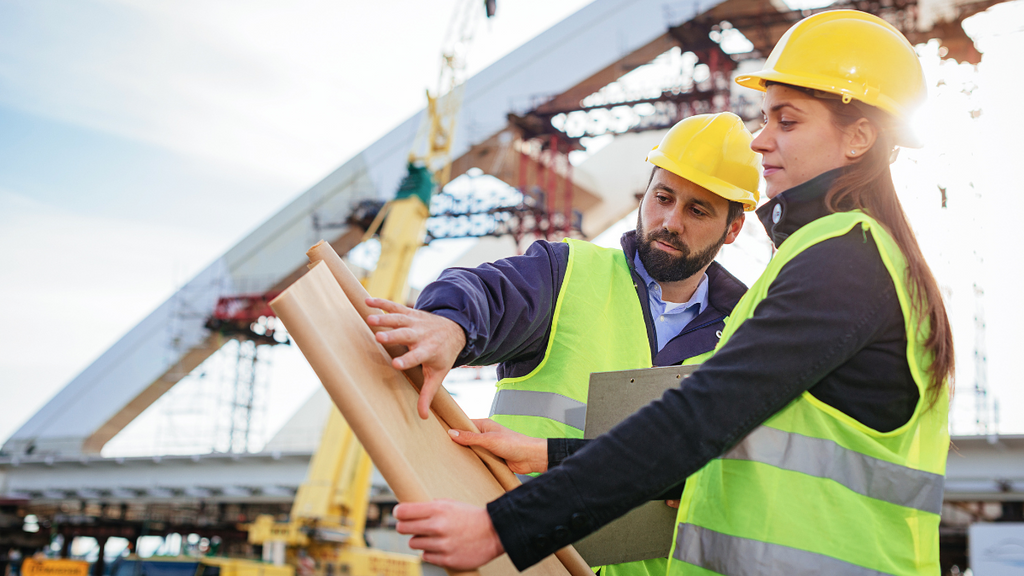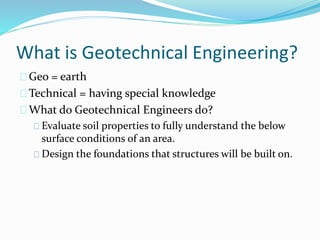The Ultimate Guide To Geotheta
The Ultimate Guide To Geotheta
Blog Article
Everything about Geotheta
Table of ContentsAn Unbiased View of GeothetaA Biased View of GeothetaGetting The Geotheta To WorkExcitement About GeothetaGeotheta for Beginners

They carry out website investigations, accumulate samples, execute laboratory tests, and assess information to evaluate the viability of the ground for building jobs - Tailings Engineer. Based upon their findings, geotechnical engineers supply referrals for structure style, slope stability, retaining structures, and reduction of geotechnical dangers. They collaborate with other professionals, such as architects, structural engineers, and building and construction teams, to ensure that geotechnical considerations are integrated right into the total job style and execution
By evaluating the behavior and homes of dirt and rock, they can determine prospective geotechnical threats such as landslides, soil settlement, or incline instability. Their proficiency helps protect against failings or accidents that could jeopardize lives and residential or commercial property. Right here are some comprehensive responsibilities and obligations of a geotechnical designer: Website Investigation: Geotechnical engineers conduct site examinations to gather data on subsurface conditions.
They analyze the information to understand the buildings and habits of the soil and rock, including their strength, leaks in the structure, compaction attributes, and groundwater problems. Geotechnical Analysis and Design: Geotechnical designers examine the data gathered throughout website examinations to examine the stability and viability of the site for construction tasks. They carry out geotechnical computations and modeling to assess variables such as bearing ability, negotiation, slope stability, side earth pressures, and groundwater circulation.
Geotheta Can Be Fun For Anyone
Foundation Style: Geotechnical designers play a critical function in developing foundations that can safely support the desired structure. They analyze the dirt conditions and lots demands to establish the appropriate structure kind, such as superficial foundations (e.g., footings), deep foundations (e.g (https://giphy.com/channel/geotheta)., heaps), or specialized strategies like dirt enhancement. They think about elements such as negotiation restrictions, birthing capability, and soil-structure communication to establish optimal structure designs
They review building and construction strategies, screen website activities, and perform area evaluations to verify that the design recommendations are followed. If unanticipated geotechnical issues develop, they evaluate the scenario and provide suggestions for remediation or changes to the design. Danger Evaluation and Mitigation: Geotechnical engineers evaluate geotechnical hazards and risks linked with the task website, such as landslides, liquefaction, or dirt erosion.

Cooperation and Interaction: Geotechnical designers work closely with other specialists associated with a job, such as engineers, structural engineers, and construction groups. Reliable interaction and collaboration are necessary to incorporate geotechnical considerations right into the general project style and building and construction process. Geotechnical engineers give technological competence, response questions, and make sure that geotechnical requirements are met.
Examine This Report on Geotheta
Below are some kinds of geotechnical designers: Foundation Designer: Foundation engineers specialize in developing and assessing structures for structures. They evaluate the dirt conditions, tons requirements, and website characteristics to figure out one of the most appropriate structure kind and layout, such as shallow foundations, deep structures, or specialized techniques like heap structures.
They evaluate the elements affecting slope stability, such as soil residential properties, groundwater conditions, and site link slope geometry, and create methods to prevent incline failures and reduce threats. Earthquake Engineer: Quake engineers specialize in evaluating and making frameworks to stand up to seismic pressures. They evaluate the seismic risk of a website, review soil liquefaction potential, and create seismic design standards to guarantee the security and durability of frameworks during earthquakes.
They execute field screening, collect examples, and assess the gathered information to characterize the soil buildings, geologic formations, and groundwater problems at a website. Geotechnical Instrumentation Designer: Geotechnical instrumentation engineers concentrate on monitoring and determining the habits of dirt, rock, and structures. They set up and keep instrumentation systems that monitor factors such as soil negotiation, groundwater levels, slope activities, and structural displacements to assess performance and give very early cautions of prospective problems.
The Definitive Guide to Geotheta
They perform tests such as triaxial tests, combination examinations, direct shear examinations, and leaks in the structure tests to gather data for geotechnical evaluation and layout. Geosynthetics Designer: Geosynthetics engineers focus on the design and application of geosynthetic materials, such as geotextiles, geogrids, and geomembranes. They use these products to boost soil security, enhance slopes, offer drainage solutions, and control erosion.
They have a tendency to be investigative individuals, which suggests they're intellectual, introspective, and inquisitive. They are interested, systematic, logical, logical, and sensible. Some of them are additionally social, suggesting they're kind, charitable, participating, client, caring, useful, understanding, skillful, and pleasant - Consulting Engineers.
In the workplace environment, geotechnical engineers make use of specialized software tools to do estimations, produce layouts, and analyze data. They prepare reports, testimonial task requirements, interact with customers and employee, and coordinate task tasks. The office setup supplies a helpful atmosphere for research study, analysis, and partnership with various other experts associated with the project.
Not known Facts About Geotheta
They frequently visit job websites to perform website examinations, analyze geotechnical conditions, and gather data for evaluation. These visits entail traveling to different places, often in remote or tough terrains. Geotechnical engineers may execute soil tasting, conduct examinations, and monitor building and construction activities to guarantee that the geotechnical elements of the job are being executed correctly.
Geotechnical engineers also work in specialized geotechnical research laboratories. Geotechnical research laboratory designers function extensively in these atmospheres, taking care of screening tools, running instruments, and videotaping information.
Report this page